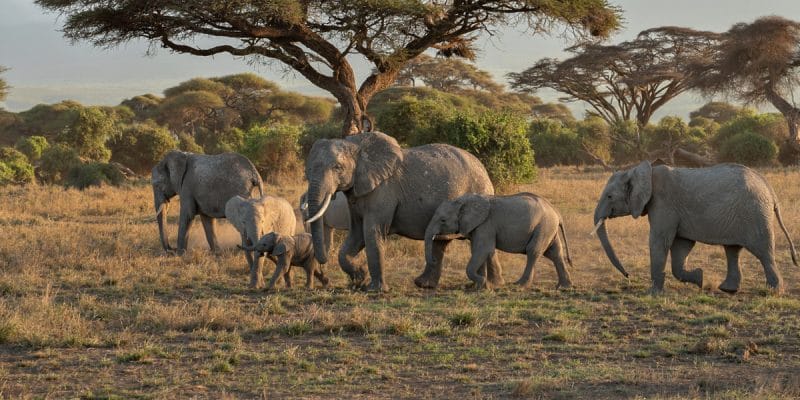A herd of savanna elephants will be transferred from southern England to southern Kenya, where the pachyderms will be reintroduced into their natural habitat. With thirteen elephants, weighing 25 tonnes, on a plane, for a 7,000 km flight, the operation that the British foundation Aspinall is about to carry out is presented as a "world first" in terms of reintroduction.
Aspinall is preparing to take up a challenge that is both biological and logistical. This British nature conservation association, of which Carrie Johnson, the wife of British Prime Minister Boris Johnson, as communications director, plans to move a herd of 13 elephants from Howletts Wild Animal Park in southern England to southern Kenya in 2022, where two sites are being studied. The herd of pachyderms, which weighs around 25 tonnes, will travel on a Boeing 747 for a 7,000 km flight. Each elephant will be enclosed in a crate adapted to its morphology and a veterinary assistant will be present throughout the flight. “This is the first time that a herd of breeding elephants has been reintroduced into the wild,” explains the foundation, which plans to organise this reintroduction in 2022.
The cost of the operation is £1 million, or €1.17 million. To raise this sum, Aspinall has launched a fundraising campaign on the JustGiving website. By the afternoon of Tuesday July 6th, 2021, the day the project was announced, contributions had already reached almost 250 000 pounds, or 292 325 euros.
Doubling the life expectancy of animals
Aspinall’s aim is to save these elephants, a species threatened with extinction according to the International Union for Conservation of Nature (IUCN). “Elephants in captivity do not live as long as their wild cousins. For example, female elephants kept between four grids have a life expectancy that is twice as short as their wild counterparts. Reproduction is also more complicated,” explains the foundation.
Read also, KENYA: when elephants and avocados fight over the Rift Valley
And the fact that Kenya was chosen from among the 54 African states can be explained by the East African country’s success in protecting its wildlife. In August 2020, Kenya’s Minister of Tourism Najib Balala announced that the number of elephants in the country had more than doubled in the space of 30 years. Between 1989 and 2018, the population of elephants living in Kenya has increased from 16,000 to 34,000. The Kenyan government attributes this achievement to its anti-poaching policy. According to official figures, the number of elephants poached in Kenya has fallen from 80 in 2018 to 34 in 2019.
Boris Ngounou





